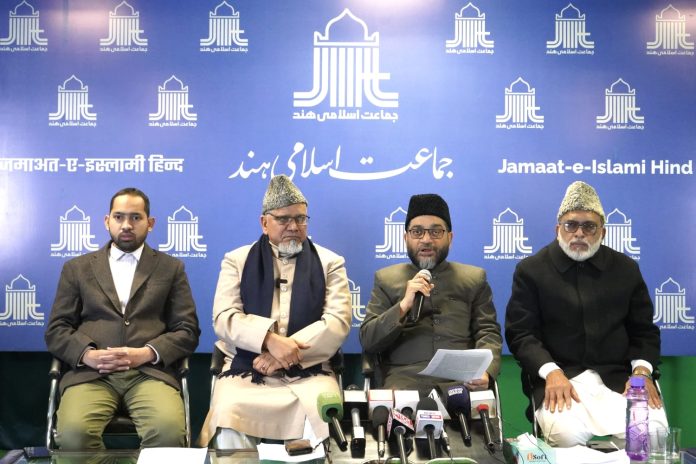New Delhi: Jamaat-e-Islami Hind has announced its vision for an inclusive budget and declared 2025 as the Year of Communal Harmony, Trust, and Understanding. Address a press conference at its headquarters on Thursday, the organisation also announced to present its budget recommendations to the Union Finance Minister.
Jamaat-e-Islami Hind President, Syed Sadatullah Husaini, emphasised the need for transformative changes in budgetary policies to address inequality, unemployment, and marginalisation. Speaking to media representatives, he highlighted the context of the Union Budget 2025-26, which comes amidst a severe livelihood crisis with youth unemployment stands at a staggering 45.4%, nearly 20% of the population lives in poverty, and agrarian GDP growth has fallen to 2.8%, as per CMIE data.
Husaini urged a shift from a supply-side approach that favours business growth and tax incentives to a demand-side strategy aimed at enhancing citizens’ purchasing power, stimulating consumption, and expanding welfare programs.
Key Budgetary Recommendations include:
Expand MGNREGA: Reverse the 33% budget cut and introduce an urban equivalent to address urban joblessness.
Boost Rural Economy: Establish Rural Employment Hubs focused on renewable energy, agro-processing, and organic farming. Develop high-quality rural townships with urban-level amenities.
Support MSMEs: Allocate resources for subsidised credit, technology upgrades, tax incentives, and infrastructure to revitalise MSMEs and boost job creation.
Link PLI to Job Creation: Tie Production Linked Incentives (PLI) to employment generation, targeting youth, marginalised groups, and underdeveloped regions.
Increase Healthcare Spending: Raise health expenditure to 4% of GDP, expand Ayushman Bharat for universal coverage, and include outpatient care and diagnostics.
Mission Shiksha Bharat: Allocate 6% of GDP to education, expand secondary education under RTE, and improve rural education infrastructure.
Empower Minorities: Revive scholarships, provide interest-free loans, and establish skill zones in minority-dominated districts.
SC/ST Empowerment: Launch a Land Empowerment Programme, prioritise public procurement from SC/ST enterprises, and introduce tax incentives for jobs.
Resolve Agrarian Crisis: Offer debt relief, interest-free loans, guaranteed MSP, expanded crop insurance, and digitised land records.
Universal Basic Income (UBI): Initiate a phased rollout for vulnerable groups, ensuring economic security through DBT and Aadhaar-linked transfers.
Revenue Measures of the recommendations include:
Cap GST on Essentials: Limit GST on essential goods to 5% and introduce a Luxury and Non-Essential Goods Tax (LNGT).
Windfall and Corporate Tax: Impose a Windfall Tax on net assets above ₹1,000 crore and reinstate a 30% corporate tax for large corporations.
Increase States’ Share: Raise states’ share in central taxes from 41% to 50%.
Levy Digital Taxes: Tax foreign tech firms and e-commerce platforms benefiting from Indian consumers and data.
Tax-Exempt Infrastructure Bonds: Launch bonds to fund critical projects and attract investments.
Strengthen CSR: Tighten norms, simplify reporting, and introduce impact metrics for education, healthcare, and rural development funding.
The JIH President also expressed concern over the rise in communal rhetoric, Islamophobia, hate speeches, and mob lynching. He urged religious leaders, civil society, and peace-loving citizens to unite in restoring harmony. Jamaat has called on socio-religious organisations to join its campaign for communal trust and understanding, supported by over 1,000 Sadvhawana Manch across India.
He strongly condemned the political vendetta and lawlessness in Sambhal, urging citizens to reject hate politics. “Rule of law must prevail, not just in Sambhal but everywhere,” he said, emphasising the importance of focusing on employment, poverty alleviation, and national growth instead of divisive politics.




